| Srl | Item |
| 1 |
ID:
108622
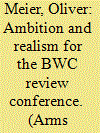

|
|
|
|
|
| Publication |
2011.
|
| Summary/Abstract |
Paul van den IJssel, the Dutch ambassador to the Conference on Disarmament, is president-designate of the 2011 Biological Weapons Convention (BWC) Review Conference, which is scheduled to take place December 5 to 22. He is a career diplomat in the Dutch Ministry of Foreign Affairs.
Van den IJssel spoke with Arms Control Today by telephone from Geneva on September 30 about the upcoming review conference. He said he was seeing a "convergence of views" on many of the key issues, but emphasized that there still is much work to be done to close the remaining divisions on technical and political issues.
|
|
|
|
|
|
|
|
|
|
|
|
|
|
|
|
| 2 |
ID:
110600
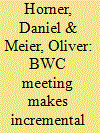

|
|
|
|
|
| Publication |
2012.
|
| Summary/Abstract |
The 2011 Biological Weapons Convention (BWC) Review Conference ended Dec. 22 with participants generally saying they were satisfied with the consensus agreement on a final document but with many expressing some disappointment that the conference failed to adopt significant changes in the treaty regime.
|
|
|
|
|
|
|
|
|
|
|
|
|
|
|
|
| 3 |
ID:
076383
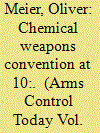

|
|
|
| 4 |
ID:
174483


|
|
|
|
|
| Summary/Abstract |
In May 2020, a debate erupted in Germany on the future of NATO nuclear sharing and Berlin’s participation in the arrangement that has seen U.S. nuclear weapons deployed in European nations for decades. This may well turn out to be an opportunity for the alliance, European security, and arms control. Even though it might not sound very realistic today, within the next five years the United States could withdraw the tactical weapons it deploys in Europe with no negative consequences for NATO unity and the security of Europe. In order to secure such an outcome, German leaders and NATO policymakers will have to combine reassurance and arms control in novel and smart ways.
|
|
|
|
|
|
|
|
|
|
|
|
|
|
|
|
| 5 |
ID:
189675


|
|
|
|
|
| Summary/Abstract |
Future efforts to maintain and strengthen multilateral arms control will have to take China into account. Beijing has abandoned its previous restraint and is actively shaping the global security order of the 21st century. It sees itself as a global player, a trading power, a major power in Asia, and the world's largest developing country, although it would be more accurate to say it is a country that has been developing rapidly.
|
|
|
|
|
|
|
|
|
|
|
|
|
|
|
|
| 6 |
ID:
081462
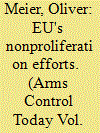

|
|
|
| 7 |
ID:
183350


|
|
|
|
|
| Summary/Abstract |
Europe remains deeply divided over the Treaty on the Prohibition of Nuclear Weapons (TPNW), with NATO membership the main political fault line between treaty critics and sympathizers. Since 2010, NATO has described itself as a nuclear alliance. In December 2020, all 30 of its members collectively stated their opposition to the ban treaty, but that appearance of unity is vanishing as the treaty picks up support in key allied nations.
|
|
|
|
|
|
|
|
|
|
|
|
|
|
|
|
| 8 |
ID:
119014
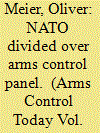

|
|
|
| 9 |
ID:
107369
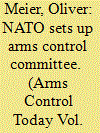

|
|
|
|
|
| Publication |
2011.
|
| Summary/Abstract |
NATO defense ministers agreed in principle during a March 10-11 meeting to set up a new arms control body, but discussions about the committee's task and its relationship to a broader review of NATO deterrence posture continue.
|
|
|
|
|
|
|
|
|
|
|
|
|
|
|
|
| 10 |
ID:
115784


|
|
|
| 11 |
ID:
187490


|
|
|
| 12 |
ID:
115585


|
|
|
| 13 |
ID:
121711


|
|
|
|
|
| Publication |
2013.
|
| Summary/Abstract |
Differences over language addressing the possible use of chemical weapons in Syria sharply divided the recent review conference of states-parties to the Chemical Weapons Convention (CWC), according to official statements at the conference and interviews with key participants and observers in recent weeks. Some diplomats, speaking on background, described the conference as being on the verge of failing to reach agreement on a final document over the differences on how to deal with that subject.
|
|
|
|
|
|
|
|
|
|
|
|
|
|
|
|
| 14 |
ID:
062005


|
|
|
| 15 |
ID:
127555


|
|
|
|
|
| Publication |
2014.
|
| Summary/Abstract |
Strenuous efforts are currently being made to control the spread of weapons of mass destruction (WMD) and to reduce existing stockpiles of such weapons.new talks on Iran's nuclear program have resulted in an interim agreement that could lead to a comprehensive solution of the conflict over how to better control Tehran's nuclear efforts.
|
|
|
|
|
|
|
|
|
|
|
|
|
|
|
|
| 16 |
ID:
187485
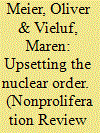

|
|
|
|
|
| Summary/Abstract |
Nationalist populists as leaders of states that possess nuclear weapons undermine the nuclear order and increase nuclear dangers in novel, significant, and persistent ways. Such leaders talk differently about nuclear weapons; they can put nuclear policy making and crisis management in disarray; and they can weaken international alliances and multilateral nuclear institutions. The rise of nationalist populists in nuclear-armed states, including some of the five nuclear-weapon states recognized under the 1968 Treaty on the Nonproliferation of Nuclear Weapons, shatters the presumed distinction between responsible and irresponsible nuclear powers and complicates attempts to heal rifts in the international order. Policies to wait out populists or to balance their influence in multilateral institutions seem to have had limited success. A sustainable strategy to deal with the challenge posed by populists would need to start by recognizing that we can no longer assume that nuclear weapons are safe in the hands of some states but not in others’.
|
|
|
|
|
|
|
|
|
|
|
|
|
|
|
|